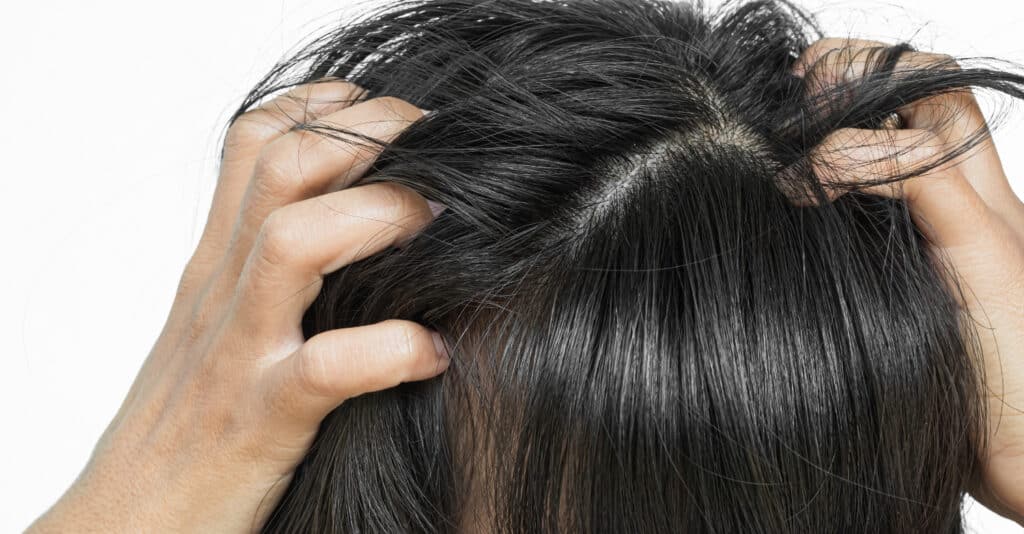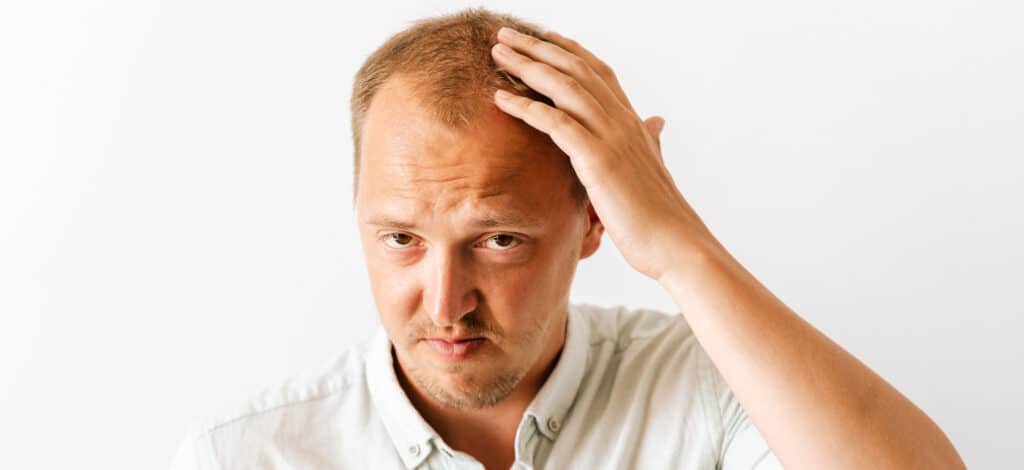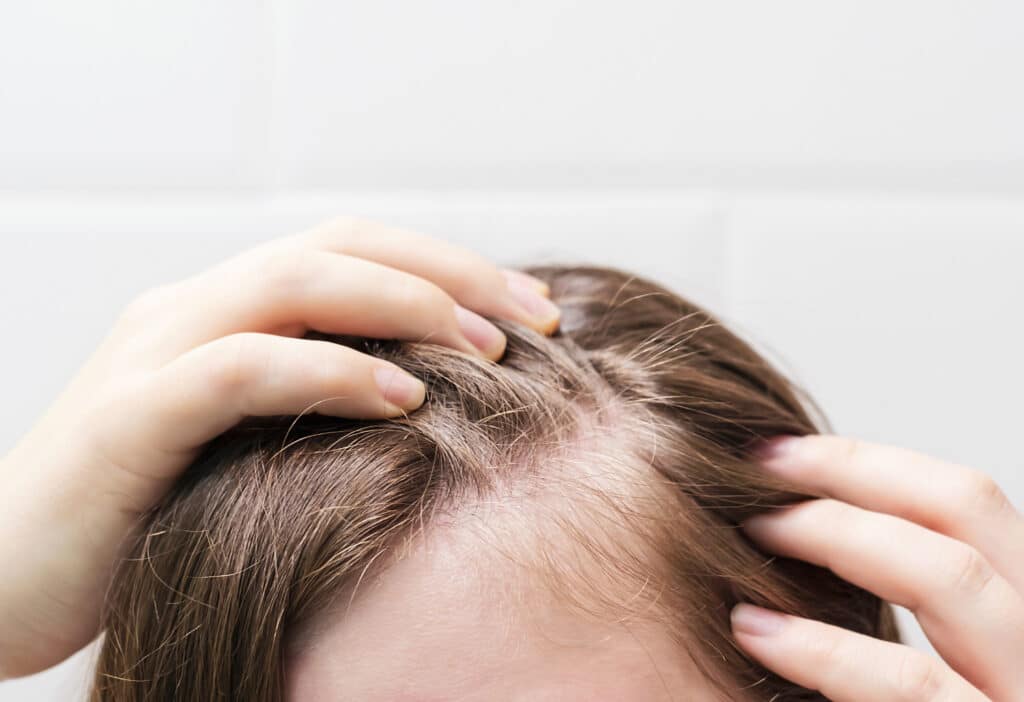Itchy Scalp and Hair Loss, Female or Male is a cause for concern. Not only does it affect one’s looks, it affects one’s self-esteem and self-confidence, too. There are times when it can take a toll on our life, so much affecting every aspect of it.
Is there a connection between itching and hair loss? What causes it and what can be done? Let’s find out, shall we?
Itchy Scalp ~ What is It?
We have heard the term itchy scalp quite often. But what is it really? Scalp pruritus, as scalp itching is otherwise called, can be quite distressing. If you have a social life, it can make things difficult for you when out and about!
Do you find yourself scratching your head often? Is your scalp irritated? If there’s no lice on your head that causes the itching, then what is it? Itching, if worsens, can even damage your hair follicles and affect its strength. There are times when an itchy scalp can be accompanied by bumps on the scalp, flaking, hair loss or patches that are scaly.
Itchy scalp could be due to various factors. It could be triggered by something as simple as dryness of the scalp, irritants or allergies. Other underlying conditions that can cause an itchy scalp are seborrheic dermatitis, fungal infections, dandruff and scalp psoriasis.

Itchy Scalp ~ What Causes It?
Itchy scalp can be due to numerous factors. Is it a normal occurrence or can there be an underlying cause? It could be something as simple as a dry scalp, or allergic reactions to irritants. This will usually go away on its own once the causative factor is eliminated.
Have you ever noticed your scalp is itchy or irritated when there’s not enough hydration or moisture? It is usually fixed when you apply a hydrating or moisturizing oil. Also, when you change your hair care products, allergies or irritants could be a cause. Just eliminating those will help!
However, it could also be something that needs attention like dandruff, scalp psoriasis, seborrheic dermatitis or even fungal infections. In such scenarios, remedial measures might be needed. If your efforts don’t show desired results, it is time to seek professional advice!
Did you know itching is common with the hair loss condition Alopecia Areata? In most cases, it is a dry scalp or dandruff or seborrheic dermatitis that’s causing itching. Other causes are not as frequent, but when there’s prolonged itching, it might need professional intervention.
Itchy Scalp and Hair Loss Connection
Itchy scalp can lead to other issues, including temporary hair loss and scalp irritation or inflammation. Did you know left unchecked itchy scalp can even cause permanent hair loss? However, does itchy scalp and hair loss go hand in hand?
It’s true that hair loss and an itchy scalp are independent, these conditions could also be linked. This means, the underlying causes could be the same. Not always are hair loss and an itchy scalp related, but this makes it even more important to take a closer look if the problems persist, isn’t it?
So, what are the times when both hair loss and an itchy scalp have a connection? It’s usually when the underlying cause is the same – for example a scalp condition that could trigger both itching and hair loss.
Let’s take a few conditions where itching and hair loss go hand in hand.
Dandruff
Dandruff itself could be due to overactive oil glands, or yeast infection or even dryness. While hair loss is not always accompanied by dandruff, in some cases it does.
Dandruff triggered by a yeast infection is a typical example of where both these worlds collide! The double whammy is that, not only does it trigger hair loss, it also causes itching and inflammation of the scalp.
Though not considered a trigger for hair loss, I have always noticed hair loss when dandruff makes an appearance. I have also observed that it is usually dryness followed by dandruff. How about you?
Alopecia Areata
Not only does this condition cause scalp itchiness and tingling, it also causes hair loss. It is more common with those having autoimmune conditions like Rheumatoid Arthritis, or Diabetes. Did you know this condition is considered a result of our hair follicles being attacked by our immune system?
Atopic Dermatitis
Though not considered as a direct cause of hair loss, it triggers itching and rashes. Scratching excessively can lead to temporary hair loss
Scalp Psoriasis
The National Psoriasis Foundation says 50% of those enduring psoriasis will also develop scalp psoriasis. This condition is characterized by scaly skin on the scalp, itching and hair loss triggered due to scratching.
Allergies or Irritants
Allergies or irritants are quite common causes of scalp itching and some can even lead to hair loss. The source of the allergens or irritants could be anything from ingredients in one of your hair care products to water or even pollutants and whatnot!
Itching or hair loss triggered as a result is usually temporary and goes away once the triggers are removed.
Did you know PPD, a very common ingredient in most commercial hair colors, can be allergic to some? Funny thing is that even bug bites can trigger itching or allergic reactions.
Tinea Capitis
Tinea capitis or scalp ringworm as it is commonly called, is a fungal infection that affects one’s scalp. Not only does it trigger itching, it also causes hair loss.
Depending on the fungi that’s affecting an individual, the hair can even break just above the scalp’s surface. It is more common in children and quite contagious.
Lichen Planopilaris
Though not common, this is a condition that’s a result of a faulty immune system and not only causes itching and hair loss, it can also cause redness, bumps, burning and whatnot. Left unchecked, it can even lead to permanent hair loss if the hair follicles are scarred or damaged.
Can Itchy Scalp Trigger Hair Loss?
Itchy scalp could cause hair loss, or an underlying condition could trigger both scalp itching and hair loss. However, there are times when scalping alone can be the reason. This is because scalping can damage the hair follicles or even disrupt a hair growth cycle.
Did you know scratching excessively can lead to inflammation, which can even damage hair follicles permanently? Not only are hair follicles damaged, there can even be scarring of the scalp. Hair doesn’t grow back on scar tissues, another reason hair loss triggered by scratching leads to loss of hair, permanently.
It is important to identify the root cause of itching to ensure scalp health. Isn’t it?

Remedies for Itchy Scalp and Hair Loss
Natural remedies can help combat scalp itching and hair loss effectively. Not only are natural remedies used to treat hair loss in traditional medicine, they also help with itching.
Even scalp conditions like itchy bumps, excessive scratching, scalp itch and more can be effectively dealt with using natural remedies. Let’s take a look at a few, shall we?
Coconut Oil
This humble only is only great for hair health, but also offers comprehensive care for your scalp. Did you know it helps combat scalp dryness, itching and inflammation thanks to the moisturizing and antimicrobial properties?
The easiest way to incorporate this remedy is a scalp massage. Standardized scalp massage results show considerable improvement in hair and scalp health with regular usage in studies.
Aloe Vera
Known for its hydrating and soothing properties, aloe vera is widely used to soothe the scalp. A gentle cleanser, it removes the dead skin cells from the scalp that can trigger itching.
It also reduces scalp inflammation and can help promote hair growth. I always noticed shinier locks when using aloe gel, though I loved that it kept my scalp healthy and curbed hair loss.
Tea Tree Oil
Though not directly related to hair loss, it helps curb itching, dandruff and a few other scalp issues. All these issues can trigger hair loss, right? Rich in antimicrobial properties, it is extensively studied for its many benefits. The antifungal and antibacterial properties keep scalp problems at bay. Healthier scalp is a happy scalp!
Peppermint Oil
Though it doesn’t seem like it can soothe your scalp, it does! Additionally, it stimulates hair growth and improves the health of hair follicles. What more can you ask for? More often, itching is a direct result of an irritated scalp. Soothing the scalp can help in more ways than one, it seems!
Ginger
An anti-inflammatory, ginger effectively combats reduces scalp inflammation. It is also rich in antioxidants and helps stimulate hair growth. Itching can lead to inflammation, certain inflammatory conditions can also trigger itching and hair loss. So, it helps in different ways.
What to Look For?
Not that we know itchy scalp and hair loss could be linked, what should we look out for? When to do what? These are common questions that many ask when visiting Vitamins Revive for their queries.
Itchy scalp could itself cause hair loss, because scratching can affect hair growth, damage hair follicles, leave you with scars and whatnot. Hair loss left unchecked can result in reduction in volume, hair thinning of hair and more.
It’s a good idea to try home remedies before going for conventional treatment options. However, if there is no improvement after a few weeks, or if your symptoms worsen, it is time to seek medical attention. There are times when a medical treatment might be needed depending on the root cause.
Treatment Options for Itchy Scalp and Hair Loss
There are times when simple changes can do wonders to curb scalp itchiness and hair loss. It is more common when allergies or irritants trigger them. Experts suggest medicated shampoo when other remedial measures don’t yield results.
Irrespective of the cause, put brakes on the temptation to scratch your head! Scratching excessively can increase hair loss and even leave you with scars.
Underlying cause triggering your itchy scalp and hair loss? Consult a specialist to know more about the root cause and treatment options.
Light therapy, oral medication or even topical medications are suggested depending on the causative factors. A fungal infection usually calls for a topical antifungal medication, though oral medications are administered for scalp ringworm.
Conclusion
Whether it is treating hair loss or itchy scalp, it starts with identifying the root cause. As always, while natural remedies are great and free from adverse effects, it is important to seek help if there’s no improvement.
Sometimes, a specialist’s advice and analysis can help greatly. They’re there for a reason and this is what they do day in and day out. Anything else you think will help? Any changes? What do you think you should do?

